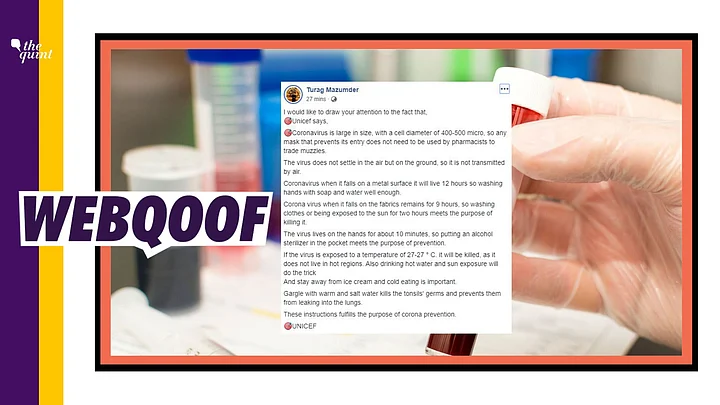With 28 confirmed cases of novel coronavirus in India and the global number climbing to 93,000, there is a deluge of misinformation around the outbreak.
CLAIM
Against this backdrop, an unverified message claiming to be from UNICEF (United Nations International Children Education Fund) is doing rounds on various social media platforms.
The message is being widely shared on Facebook, WhatsApp and Twitter.
WHAT WE KNOW SO FAR
The Quint can confirm that the guidelines mentioned in the viral message are misleading and have not been issued by UNICEF. You can find the list of UNICEF guidelines on coronavirus here.
Now, let us asses the veracity of each claim.
1. The virus does not settle in the air, but on the ground, so it is not transmitted by air: While the viral message claims that coronavirus is not transmitted by air and settles on the ground, according to WHO findings, coronavirus can spread from person to person through small droplets, when a person with COVID-19 coughs or exhales. These droplets land on objects and surfaces around the person. Other people then catch COVID-19 by touching these objects or surfaces, then touching their eyes, nose or mouth. People can also catch COVID-19 if they breathe in droplets that are coughed out or exhaled by a person with COVID-19. So far, there is no information about where the virus settles.
2. Coronavirus when it falls on a metal surface, will live for 12 hours, so washing hands with soap and water well enough: Quint FIT spoke to Professor Ramanan Laxminarayan, Director of Centre for Disease Dynamics, Economics and Policy, who informed us that washing hands and using hand sanitisers are important precautions one can take to prevent coronavirus infection. He also mentioned that coronavirus cannot survive on a surface for more than 12 hours.
3. If the virus is exposed to a temperature of 26-27 ° C. it will be killed, as it does not live in hot regions: The fact that coronavirus cannot survive in warmer temperatures has not been established yet. Professor Laxminarayan says, “Several coronavirus cases have been reported in tropical countries. However, as respiratory pathogens usually disappear in summers, the same is possible with coronavirus. We’ll have to wait to find that out.”
4. Drinking hot water and sun exposure will do the trick and staying away from ice cream and eating cold is important: There is no study yet which suggests that drinking hot water can help contain coronavirus or avoiding frozen food or ice creams can reduce the risks of contracting the infection. Quint Fit had earlier debunked this claim.
5. Coronavirus is large in size, with a cell diameter of 400-500 micro, so any mask that prevents its entry does not need to be used by pharmacists to trade muzzles: According to the World Health Organisation (WHO), usage of masks does not particularly help in preventing the contraction of coronavirus. A person needs to wear a mask only if they are taking care of an infected patient.
(Not convinced of a post or information you came across online and want it verified? Send us the details on Whatsapp at 9643651818, or e-mail it to us at webqoof@thequint.com and we'll fact-check it for you. You can also read all our fact-checked stories here.)
(At The Quint, we question everything. Play an active role in shaping our journalism by becoming a member today.)
